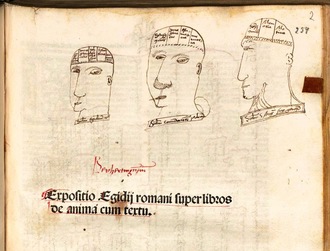The Italian Research Seminar
Bernd Goehring (Notre Dame) - “Giles of Rome on Human Cognition”
Thursday, February 21st at 4:30pm in Special Collections, Hesburgh Library

This paper examines how the medieval thinker Giles of Rome conceives of the relation between our sensory representations and the contents in our intellect. Giles was born around 1243 and died at the papal court in Avignon in 1316; he was the first member of the Augustinian order to become a master in theology at the University of Paris. The paper first analyzes the notion of cognitive presence, i.e. the notion that ideally a cognitive object is immediately present to a cognizer in the right format. Giles develops this conception of cognitive presence in his discussion of the beatific vision. Giles uses this ideal case to explicate the role of representations as functional intermediaries in cognition. The paper subsequently examines specifically the role of sensory representations in our cognition. Giles conceives of our intellect as a capacity for universal thought and assumes with Aristotle that all our cognition originates from sense-experience. According to Giles, sensory representations of particular, sensible objects are not only required for our initial concept-formation via abstraction, but also for any subsequent actualization of our intellective capacity and its contents in thought.
Bernd Goehring is Assistant Professor of Philosophy and Great Books in the Program of Liberal Studies and a Fellow of the Medieval Institute at Notre Dame. He received extensive training in Philosophy, Theology, Italian and Medieval Studies at Bonn, Florence, Oxford and Cornell. Professor Goehring's area of research specialization is Medieval Philosophy. He is currently completing a book on Henry of Ghent's theory of cognition. His publications include “Truth as Rightness in Anselm of Canterbury and Henry of Ghent” and “Thomas Aquinas on Self-Knowledge and Self-Awareness.” He is a member of the Scotistic Commission of America, an international group of scholars preparing the critical edition of the Parisian works of John Duns Scotus for the series ‘Corpus Christianorum.’ The Scotus edition is supported by a multi-year research grant from the National Endowment for the Humanities.
The Italian Research Seminar, jointly organized by the Devers Program in Dante Studies and by Italian Studies at Notre Dame, aims to provide a regular forum for faculty, postdoctoral scholars, graduate students, and colleagues from other universities to present and discuss their current research. The Seminar is vigorously interdisciplinary, and embraces all areas of Italian history, language, and culture (from literature to film, from art history to music, and from anthropology to architecture), as well as perceptions of Italy, its achievements and its peoples in other national and international cultures. The Seminar constitutes an important element in the effort by Notre Dame's community of Italianists to promote the study of Italy and to serve as a strategic point of contact for all Italianists.